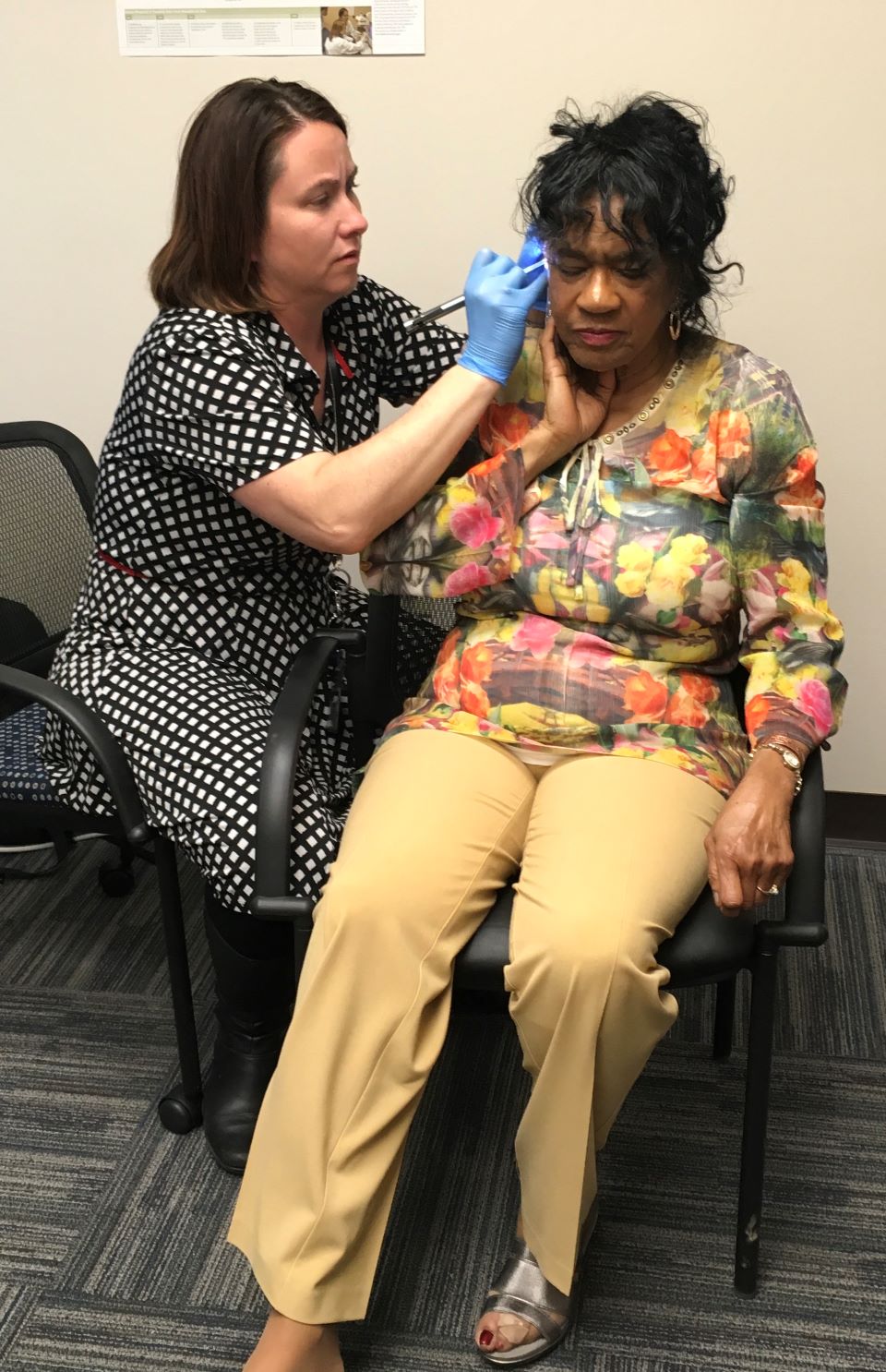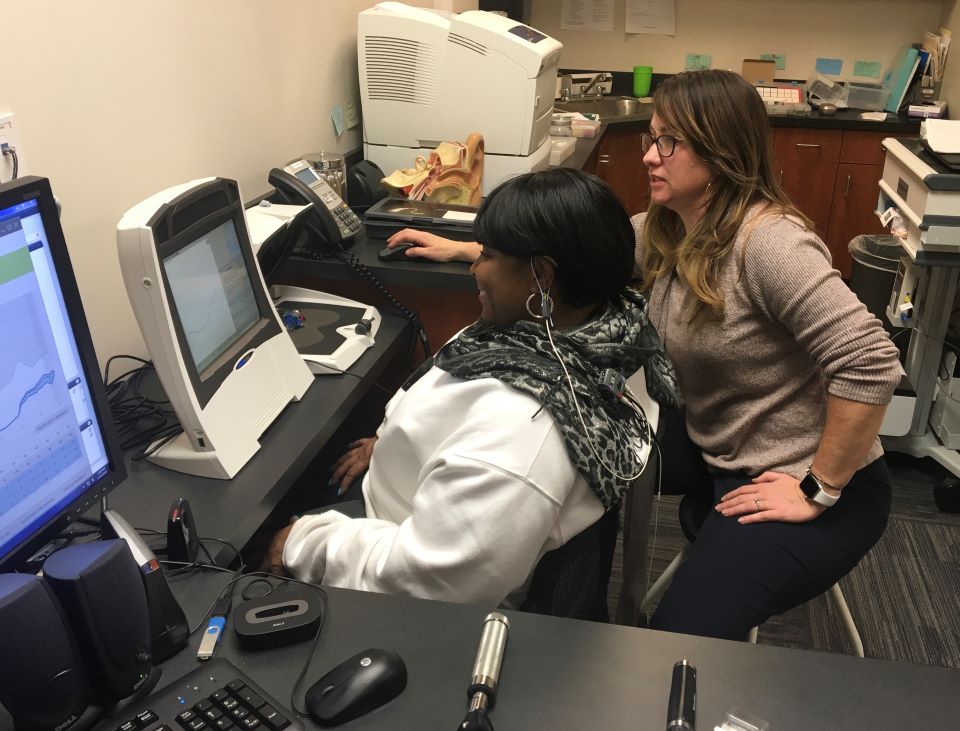SLU Team Tackles Hearing Loss, Cognitive Decline in African Americans
Bridjes O'Neil
Communications Specialist
bridjes.oneil@slu.edu
314-282-5007
Reserved for members of the media.
An interdisciplinary team at Saint Louis University is collaborating to educate African American adults 60 and over about the link between brain health and hearing loss while providing vital services for the community.
Maureen Fischer, audiology program coordinator and instructor at SLU's Paul C. Reinert, S.J., Speech-Language and Hearing Clinic, provides services for underserved and low-income populations through SLU’s Cognitive Stimulation Therapy Group for African American Elders of North St. Louis.
Fischer works closely with Whitney Postman, Ph.D., assistant professor and director of the Neuro-Rehabilitation of Language Laboratory at SLU’s Department of Speech, Language, and Hearing Sciences. Since 2017 under the auspices of Saint Louis University School of Medicine's Gateway Geriatric Education Center, Postman has led the program. The goal is to reduce health disparities in African Americans at risk for age-related cognitive decline due to illnesses such as Alzheimer’s disease and vascular dementia.
Cognitive Stimulation Therapy is a non-pharmacological group intervention that is proven to be effective for individuals in the early stages of age-related cognitive decline. Weekly group meetings are held at CareSTL Health’s Whittier location at the former Homer G. Phillips Hospital, in partnership with staff at CareSTL Health and Northside Youth and Senior Service Center, Inc.
Postman said one of the most significant modifiable risk factors for cognitive decline is hearing loss which can lead to social isolation and decreased brain stimulation for at-risk populations.

All Cognitive Stimulation Therapy group participants are screened for hearing loss by Fischer and her students. Those determined to be in need of services are referred to the HearSTL Program led by Fischer at SLU’s Audiology Clinic.
Cost-free services include diagnostic evaluations and screenings for youth and adults as well as Aural Rehabilitation. During diagnostic evaluations, Fischer discovered a prevalence of another modifiable risk factor — Type 2 diabetes.
“The next step is to create an interdisciplinary clinic collaborating with nurses and dieticians at SLU’s Trudy Busch Valentine School of Nursing and Doisy College of Health Sciences to treat and educate the community about the chronic disease,” Fischer said.
Interdisciplinary care produces the best outcomes, Fischer said.
“Our participants have already benefitted from the free hearing aids and related aural rehabilitation services offered by the HearSTL Program. They say, ‘You’ve given me my life back. I can now hear what people are talking about during our Cognitive Stimulation Therapy group discussions. I can talk on the phone more easily with my friends and family, and I can drive more safely.'"
Whitney Postman, Ph.D.
Insurance coverage is spotty for low-to-moderate-income adults. Many have appreciated the free customized hearing aids, fittings, and follow-up care, Fischer said.
“Typically, if you’re a pediatric patient, your insurance will cover hearing aids,” Fischer said. “Medicaid and Medicare typically don’t cover hearing aids.”
By partnering with the National Hearing Aid Project, HearSTL has a bank of donated hearing aids. The Hearing Aid Project brings organizations together to fulfill specific roles in the process of getting hearing aids to those who couldn’t otherwise afford them.
This work is supported by the SOM's Gateway Geriatric Education Center's receipt of a Health Resources and Services Administration grant from the U.S. Department of Health and Human Services.
For more information about services, contact the SLU Speech-Language and Hearing Clinic at 314-977-3365 or email Kellie Dalton at kellie.dalton@health.slu.edu.
About Doisy College of Health Sciences
Long a leader in educating health professionals, Saint Louis University offered its first degree in an allied health profession in 1929. Today, the Doisy College of Health Sciences offers degrees in physical therapy and athletic training, biomedical laboratory science, nutrition and dietetics, health informatics and information management, health sciences, medical imaging and radiation therapeutics, occupational science and occupational therapy, speech, language and hearing sciences, and physician assistant education. The college's unique curriculum prepares students to work with health professionals from all disciplines to ensure the best possible patient care.
About Saint Louis University School of Medicine
Established in 1836, Saint Louis University School of Medicine has the distinction of awarding the first medical degree west of the Mississippi River. The school educates physicians and biomedical scientists, conducts medical research, and provides health care on a local, national, and international level. Research at the school seeks new cures and treatments in five key areas: cancer, liver disease, heart/lung disease, aging and brain disease, and infectious diseases.


















